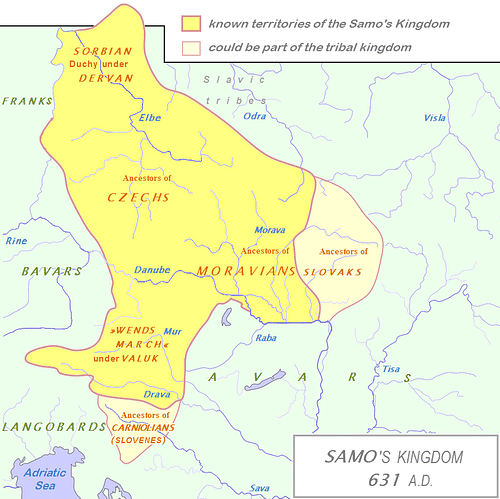
Samo (reigned 623/624-658 CE) was a king of the Slavs who was responsible for the foundation of the first recorded political entity of the Slavic people, usually referred to as Samo's Empire. Since writing was not introduced into Slavic culture until the 9th and 10th centuries CE, there are no contemporary accounts on Samo written by the Slavs. The primary source on Samo is a Frankish document of uncertain authorship known as the Chronicle of Fredegar, originally written in the 7th century CE. Although many scholars have debated the authorship and reliability of Fredegar's account, it is generally accepted today as a reliable source written by a single author. While no historian or scholar accepts the claim that Fredegar was an eyewitness to the events he records, it is believed that he had access to documents, or witnesses, relating to those events.
Origin & Rise to Power
According to the Chronicle of Fredegar, Samo was originally a Frankish merchant who may have been a kind of arms-dealer who provided the Slavs with weapons. He makes his first appearance in history at some point in 623/624 CE, “in the fortieth year of Chlothar's reign”. There were many Slavic tribes at that time, but one tribe in particular, the Wends, elected Samo as their leader and king. The exact location of Samo's kingdom is still a debated matter, and several places around Slovakia, Slovenia, and eastern Austria have been proposed as the centres of Samo's realm. The Wends were a Slavic confederation, not a homogeneous tribe who, by the 5th century CE, occupied an area between the Oder River to the east and the Elbe and Saale rivers to the west, neighbouring the western borders of the territory occupied by the Franks. During the 6th century CE, the Franks and other Germanic groups alternated periods of peace and war with the Wends. Chief among these adversaries/allies were the Avars under Bayan I (562/565-602 CE), who used the Wends as front-line shock troops in battle. The historian Florin Curta cites Fredegar in claiming that the Wends were totally subject to the Avars under Bayan I. In the following passage from Curta's work, Fredegar uses the word "Huns" for "Avars" as was his common practice:
Every year, the Huns wintered with the Slavs, sleeping with their wives and daughters, and in addition the Slavs paid tribute and endured many other burdens. The sons born to the Huns by the Slavs' wives and daughters eventually found this shameful oppression intolerable; and so, as I said, they refused to obey their lords and started to rise in rebellion (Slavs in Fredegar, 148-149).
Bayan I died in 602 CE, and the Avar Empire began to fall apart soon after. Bayan I had led his army against the forces of the Eastern Roman Empire repeatedly since c. 568 CE and, even before his death, the empire had begun to mobilize to push the Avars back toward Pannonia. After Bayan I's death, however, the empire increased its efforts.
The Eastern Empire drove its armies against the Avars and, at about the same time, Samo took the initiative for his people. We know from ancient accounts that Samo organized an army against the Avars and proved to be a skilled commander. He defeated the Avars on numerous occasions, and he freed the Slavs from their submission to Avar oppression. It is not clear whether this conflict took place after or before the siege of Constantinople in 626 CE. If we take the ancient documents at face value, then Samo led a Wendish rebellion against the Avars in 624 CE, before the siege of Constantinople. However, scholars have regularly noted concerns about the reliability of the chronology presented in the Chronicle of Fredegar and suggest that Samo's military campaigns against the Avars actually took place after the siege of Constantinople, which would mean that Samo took advantage of the Avar defeat to free the Slavs of Avar rule. This scenario would seem to make the most sense in that the Avars were in a vulnerable position following their defeat at Constantinople, and a skilled leader would have recognized this as the time to strike. The date of 624 CE makes less sense in that it is known that the Slavs took part in the siege of Constantinople, something they most likely would not have done had they recently thrown off Avar rule.
Whatever the case may be, Samo gained the favour of the Slavs after proving his leadership and courage by defeating the Avars. Early in the 600's CE, after suffering multiple Avar/Slavic raids, the Romans organized a campaign against them with no positive results. A force of Slavs and Avars joined together, with the support of other groups such as the Bulgars, and laid siege to Constantinople in 626 CE. The Romans repelled the attack, and the barbarians left empty-handed. A work by George of Pisidia (7th century CE) suggests conflicts between the Avars and the Slavs erupted after their defeat in 626 CE, but tensions between the two people are recorded earlier by Fredegar, and the conflicts between the Slavs and Avars were almost certainly the result of decades-long oppression of the former by the latter. What the Slavs were lacking was a strong leader, and that leader was Samo.
Expansion of Samo's Kingdom
Samo also built a solid political leadership by forging alliances with several Wendish families: he is reported to have married at least twelve Wendish women who bore him 22 sons and 15 daughters. His involvement in long-distance trade secured him considerable wealth and high status. This status, however, did not secure his new kingdom against the powerful Franks on his border. The Franks were Christian, while the Slavs under Samo were pagan; this situation seemed to justify, to the Franks, their repeated invasion of Slavic lands under the pretense of conversion. Samo negotiated a treaty with Dagobert I, the Frankish king, but the peace would not last for long.
In c. 630 CE, Dagobert I demanded that Samo send him those Slavs who had "killed and robbed a great number of Frankish merchants." Samo agreed that such criminals should be punished but only after due process had determined who they were and why - or if - they had committed such crimes. Samo "simply stated his intention to hold an investigation so that justice could be done in this dispute, as well as in others that had arisen between them in the meantime (Fredegar, IV, 68). He therefore refused to send the accused men to the Frankish king. Dagobert I seized upon this refusal as a breach of the treaty and led a large expedition against the Slavs.
Already a powerful man, Samo's position became even stronger in 631 CE when he defeated the Franks in the Battle of Wogastisburg. Dagobert I led a force of three armies against the Slavs who, commanded by Samo, defeated the Frankish invaders, decimating their forces, and driving the survivors from the field. As a result of the Frankish defeat, several Slavic groups that were subordinate to the Franks were released from their servitude, and a local leader named Dervan (also known as Dervanus) declared his loyalty and submission, and that of his people, to Samo. Thus, Dervan joined Samo and supported him in his subsequent military campaigns. After the victory against the Franks, Samo invaded and raided the eastern frontier of the Frankish realm several times.
Concerned about the Slavic raids, the Frankish authorities appointed Radulf, the Duke of Thuringia, with the task of protecting the Frankish border against Samo's threat. Radulf was initially successful in defending the Frankish borders against Samo but, sometime around 640 CE, an internal Frankish political struggle forced Radulf to battle against other Frankish groups. The Chronicle of Fredegar states that Radulf then sought to strengthen his position by forming an alliance with Samo, which means that Samo's power and prestige was still significant at that time. No Frankish force could stand against him, and he secured his kingdom against all future attempts at outside control or invasion for the next 18 years.
SAMO'S DEATH
Samo died in 658 CE, and the kingdom he had built died with him. Despite his influence, power, and wealth, none of his 22 sons succeeded him as a king. This may suggest that, within the political structure of the Slavs, rule was not inherited but granted based upon personal merit (as was known to be the case with the Avars prior to Bayan I's rule). Samo's sons seem to have lacked their father's skills, and no successor to the kingdom he founded is recorded. The Avars swiftly entered the territory occupied by the Slavs after Samo died and re-established their previous dominance over the people until their defeat by the Franks under Charlemagne in 796 CE. The powerful position of the Slavs in the region during Samo's time diminished swiftly after his death when they became subjects of, first, the Avars, and then of the Franks. As with many great leaders, Samo's individual character held his people together, and his skills in leadership and battle allowed them to prosper, but these virtues were not passed on to his successors. He is remembered today as a great king and charismatic leader who united his people in their fight for freedom and succeeded, even if only for a limited time.

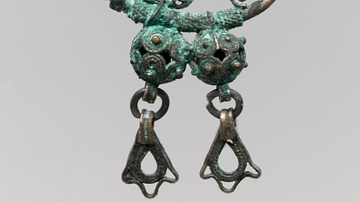

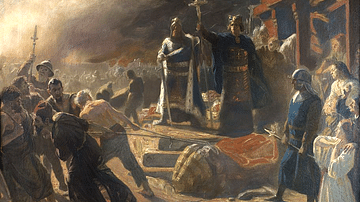
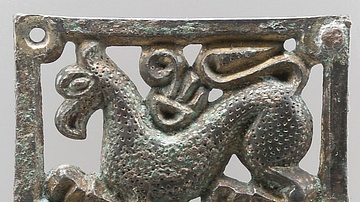
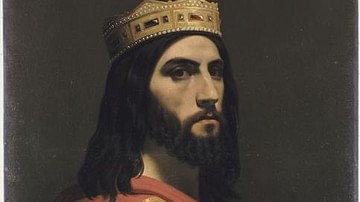
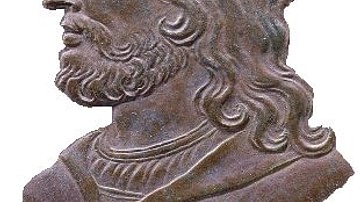
![Making of the Slavs (01) by Curta, Florin [Hardcover (2001)]](https://m.media-amazon.com/images/I/21pVaeuV6IL._SL160_.jpg)



